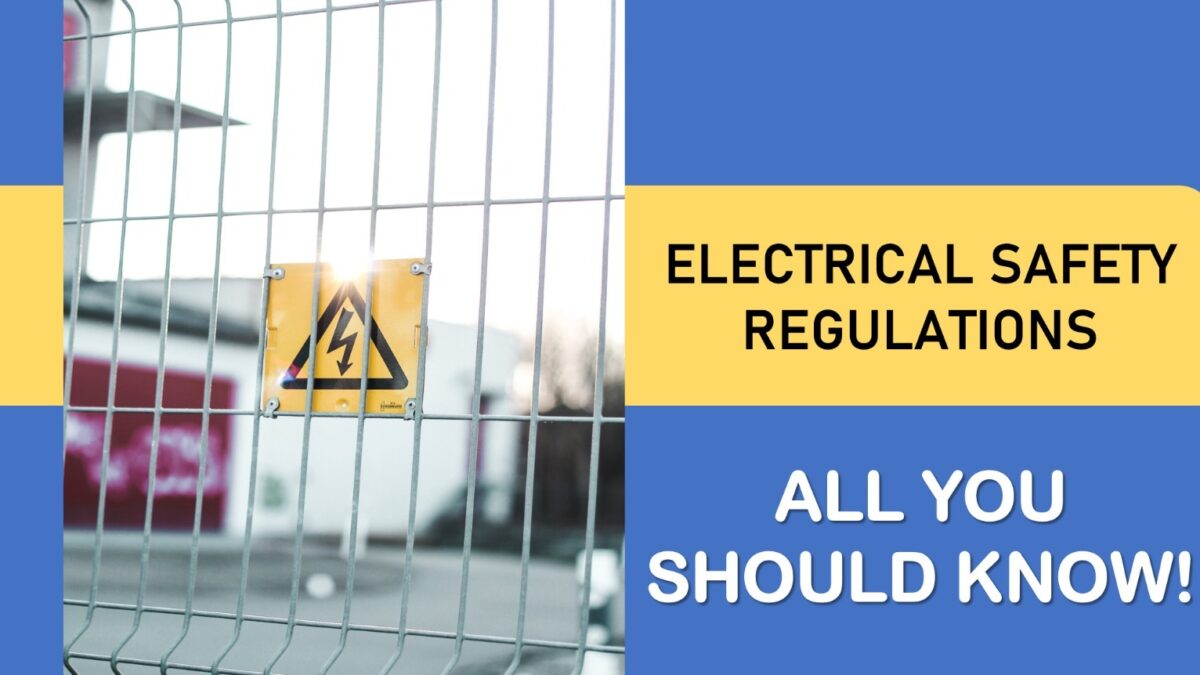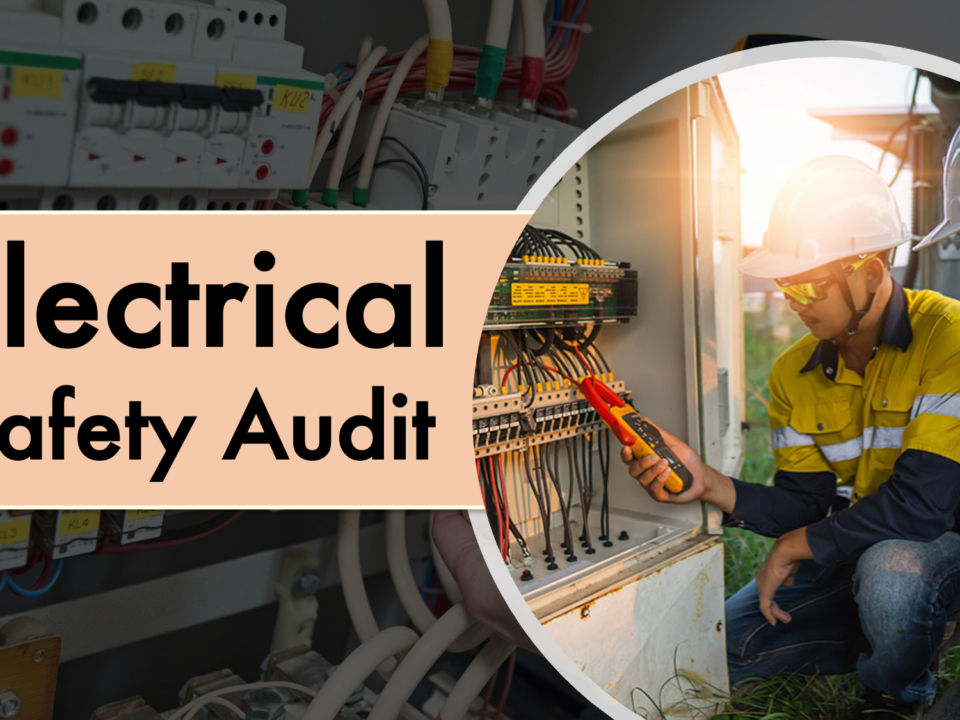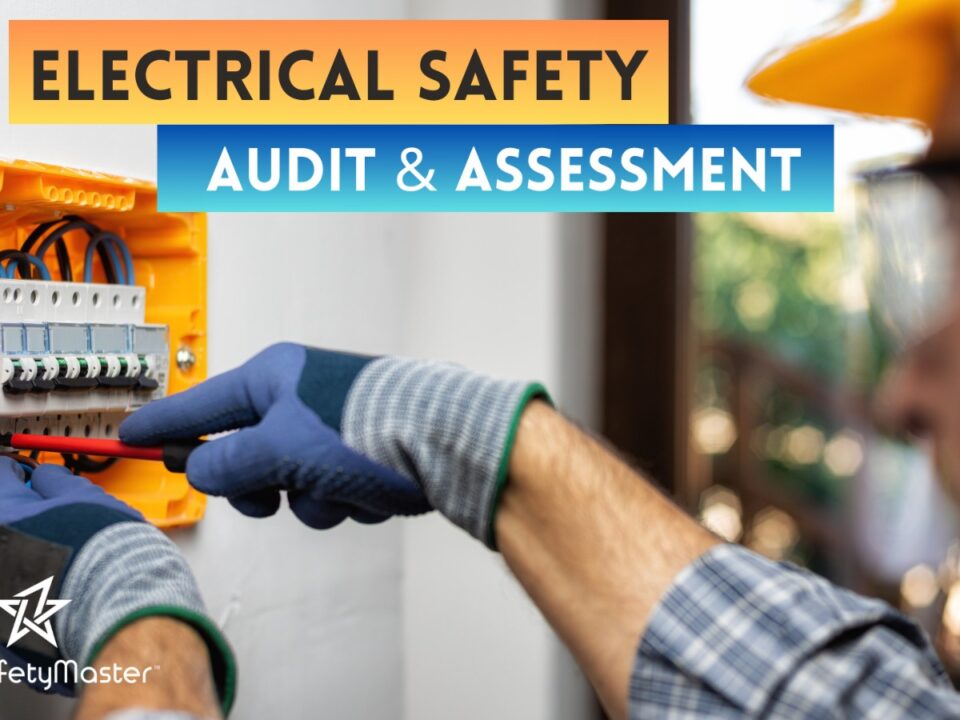Electrical safety regulations in India

Navigating Fire Risk Assessment: Strategies for Safety Mastery
September 29, 2023
Hazardous area classification standards for flammable substances
October 5, 2023Electricity: The Power and the Risk
Electricity, the invisible force that powers our modern world, is both a marvel and a potential hazard. From the moment we flick a switch or plug in an appliance, we tap into a powerful energy source that fuels our lives. However, with great power comes great responsibility.
The mesmerizing dance of electrons within electrical circuits brings light to our homes, propels machines into motion, and enables communication at the speed of light. Yet, it is important to recognize that this immense power can also pose significant risks if not handled with care and respect.
Step into the realm of electrical safety in India, where power meets risk and knowledge paves the way for a safer tomorrow. In a world fueled by electricity, it is crucial to understand and mitigate the potential dangers that lurk within our daily lives. From electrocution to fires, the risks associated with improper electrical practices are not to be taken lightly.In this comprehensive article, we will delve into the intricate web of electrical safety regulations in India. We shall explore the laws put in place to protect individuals and properties from harm, while also shedding light on practical tips to ensure personal safety. So fasten your seatbelts as we embark on a journey towards enlightenment and empowerment!
The Shocking Truth: Understanding the Dangers of Electricity
Electricity, a marvel of modern civilization, powers our world and brings light into the darkest corners of our lives. However, beneath its illuminating facade lies a hidden danger that demands our utmost respect. To truly comprehend the significance of electrical safety regulations in India, we must first understand the shocking truth about the inherent hazards posed by this powerful force.
Electricity is not a gentle companion; it is a formidable adversary that can unleash devastating consequences if mishandled. Its invisible currents can penetrate our bodies with deadly force, disrupting our heart rhythms and causing severe burns. Every year, countless lives are tragically impacted by electrical accidents, leaving families shattered and communities grieving.
Unveiling the Regulations: Exploring India’s Electrical Safety Laws
India, a country known for its rich cultural heritage and technological advancements, has taken significant strides in ensuring electrical safety for its citizens. The government of India recognizes the potential risks associated with electricity and has implemented comprehensive regulations to protect both individuals and property from harm.
India’s electrical safety laws are primarily governed by the Electricity Act of 2003, which provides a legal framework for the generation, transmission, distribution, and use of electricity across the nation. Under this act, various rules and guidelines have been established to enforce safety practices at every level of the electrical supply chain.
The Indian Electricity Rules, 1956 further supplement these regulations by addressing specific aspects such as installation requirements, equipment standards, wiring systems, protection against electric shocks, and fire hazards. These rules lay down meticulous guidelines that ensure safety standards are met during the design, construction, operation, maintenance, and inspection of electrical installations.
The Bureau of Indian Standards (BIS) plays a vital role in defining technical specifications for electrical appliances to guarantee their compliance with safety standards. Products bearing the ISI mark signify adherence to these specifications. This stringent certification process ensures that consumers can rely on electrical equipment that meets high-quality benchmarks.
Moreover, India’s Central Electricity Authority (CEA) has formulated codes and guidelines to promote safe practices in electrical power systems. These codes cover various technical aspects like earthing practices; protection devices like circuit breakers; insulation coordination; lightning protection; and surge suppression techniques – all aimed at mitigating risks associated with electricity.
While these regulations may seem overwhelming in their intricacy and detail-oriented
Empowering Your Knowledge: Essential Tips for Electrical Safety
Knowledge is power, especially when it comes to electrical safety. By equipping yourself with the right information, you can protect yourself and your loved ones from potential hazards. Here are some essential tips to empower your knowledge and enhance electrical safety in your daily life:
1. Respect the Power: Electricity is a formidable force that demands our respect. Always remember to treat electrical appliances and wiring with caution. Avoid touching any exposed wires or sockets, particularly when your hands are wet or damp.
2. Unplug Unattended Appliances: When not in use, make it a habit to unplug appliances rather than leave them on standby mode. This not only saves energy but also reduces the risk of electrical accidents such as short circuits or overheating.
3. Use Surge Protectors: Investing in surge protectors can be a wise decision to safeguard your valuable electronic devices against power surges caused by lightning strikes or faulty wiring.
4. Regular Inspection and Maintenance: Ensure that all electrical installations and equipment are regularly inspected by qualified professionals. Regular maintenance helps identify potential risks and prevents accidents before they occur.
5. Educate Children about Electrical Safety: Teaching children about basic electrical safety guidelines is crucial for their overall well-being at home and school. Explain the dangers of playing with electric sockets or inserting objects into them, emphasizing the importance of asking an adult for help instead.
Remember, knowledge without action is meaningless; put these tips into practice and create an environment where electrical safety becomes second nature. With awareness and diligence, we can all contribute to a safer future filled with uninterrupted
A Tale of Caution: Real-Life Stories of Electrical Accidents
Stories have a profound way of leaving a lasting impact on our minds, serving as cautionary tales that remind us of the importance of electrical safety. Let these real-life incidents be a stark reminder that negligence can have dire consequences.
In one heart-wrenching incident, a family in a bustling city experienced a tragic loss due to faulty electrical wiring. It was an ordinary evening when an unnoticed spark ignited combustible material nearby, engulfing their home in flames. Tragically, lives were lost and dreams shattered in mere moments. This incident serves as a powerful reminder that even the smallest oversight can lead to devastating consequences.
Another tale tells the story of an industrious worker who suffered severe electrocution while working on a construction site. Due to inadequate training and insufficient safety measures, this individual came into contact with exposed wires, resulting in life-altering injuries. This incident stands as an important reminder that adherence to proper safety protocols is essential not only for workers but for everyone who interacts with electricity.
While these stories may be distressing, they also serve as catalysts for change and awareness. By learning from the mistakes made in these unfortunate incidents and implementing robust safety practices, we can prevent similar tragedies from ever occurring again.
Safe from Sparks: How to Prevent Electrical Fires
When it comes to electrical safety, preventing fires is of paramount importance. Electrical fires can cause extensive damage to property and pose a significant risk to human life. Thankfully, there are several measures that can be taken to minimize the likelihood of electrical fires.
The first step in preventing electrical fires is ensuring proper installation and maintenance of electrical systems. This includes hiring qualified electricians who adhere to safety codes and regulations. Regular inspections should be conducted to identify any potential hazards or faulty wiring. Additionally, it is crucial to use the right type and size of wiring and circuit breakers for each application.
Another important aspect of fire prevention is practicing caution with electrical appliances and devices. Overloaded circuits can overheat and lead to fires, so it is vital not to overload outlets or extension cords. Regularly check for frayed or damaged cords, as well as loose connections, which can increase the risk of sparks or short circuits.
Lastly, having properly functioning smoke detectors and fire extinguishers in place can play a significant role in the early detection and containment of electrical fires. Regularly test smoke detectors, change batteries as needed, and ensure that fire extinguishers are easily accessible in case of an emergency.
Lighting Up the Darkness: Ensuring Safe Electrical Installations
In a country where millions rely on electricity for their daily needs, ensuring safe electrical installations is of paramount importance. The proper installation of electrical systems not only guarantees uninterrupted power supply but also safeguards the lives and properties of individuals. It requires a meticulous approach, adherence to regulations, and strict compliance with safety standards.
When it comes to safe electrical installations in India, it all starts with qualified professionals who possess the technical know-how and expertise. Electricians need to be well-versed in the latest codes and standards set forth by regulatory bodies. They must understand the intricacies of wiring, proper grounding techniques, circuit protection measures, and equipment selection. By employing these best practices during installation, they ensure a reliable electrical system that minimizes risks and maximizes efficiency for end-users.
The Importance of Inspection: Regular Maintenance for Electrical Safety
When it comes to electrical safety, prevention is key. While adhering to regulations and following proper installation procedures are crucial steps, regular inspection and maintenance of electrical systems are equally vital. These practices ensure the continued safety and efficient functioning of electrical installations.
Electrical systems, just like any other machinery or equipment, are subject to wear and tear over time. Components may deteriorate, connections can loosen, and insulation may degrade. Without proper inspection and maintenance, these issues can go unnoticed until a major fault or accident occurs.
Regular inspections help identify potential hazards such as frayed wires, loose connections, or outdated components that require replacement. By addressing these issues early on, the risk of electrical fires, shocks, or equipment failures can be significantly reduced.
Maintenance entails not only detecting problems but also taking preventive measures to mitigate future risks. This includes cleaning and tightening connections, replacing worn-out parts with new ones that meet safety standards, checking grounding systems for effectiveness, and ensuring compliance with regulatory requirements.
Investing in regular inspection and maintenance not only safeguards individuals from harm but also extends the lifespan of electrical equipment while improving its efficiency. It promotes a culture of safety consciousness by fostering awareness about the importance of preventive measures within households, workplaces, and communities at large.
Amplifying Awareness: Spreading the Message of Electrical Safety
It is said that knowledge is power, and when it comes to electrical safety, this saying couldn’t be more accurate. In order to create a safer environment for all, it is imperative to amplify awareness about the potential dangers of electricity and educate the masses on how to prevent accidents.
One of the most effective ways to spread the message of electrical safety is through community outreach programs. By organizing workshops, seminars, and interactive sessions, we can engage with individuals from all walks of life and equip them with crucial knowledge about electrical hazards and preventive measures. These initiatives not only raise awareness but also empower people to take control of their own safety.
Future of Electrical Safety: Advancements and Innovations in India
The realm of electrical safety in India is witnessing a remarkable transformation with the advent of cutting-edge advancements and innovative technologies. As we delve into the future, it becomes evident that a safer electrical landscape is on the horizon.
One promising development lies in the field of smart grid systems. These intelligent networks integrate advanced sensing, communication, and automation technologies to enhance the efficiency and safety of electricity distribution. By monitoring power flows in real-time, detecting faults, and automatically isolating affected areas, smart grids not only minimize downtime but also reduce the risk of electrical accidents. Additionally, these systems offer valuable data insights that empower individuals and utility companies to make informed decisions for a more secure electrical infrastructure.
Conclusion: Empowering Lives Through Electrical Safety Awareness
As we come to the end of our journey exploring electrical safety regulations in India, it is evident that knowledge and awareness are paramount in preventing accidents and promoting a culture of safety. By adhering to the guidelines set forth by regulatory bodies, individuals can protect themselves and their loved ones from the potential hazards of electricity.
It is heartening to witness the progress made in India’s electrical safety landscape. With continuous advancements and innovations, we can anticipate a future where electrical accidents become a thing of the past. By embracing emerging technologies and implementing robust safety measures, we can create an environment where every individual feels secure in their interactions with electricity.
Let us carry forward this valuable information and spread awareness about electrical safety far and wide. Through education, vigilance, and responsible practices, we can ensure that every home, workplace, and public space becomes a haven free from electrical accidents. Together, let us empower lives through the unwavering commitment to electrical safety.



